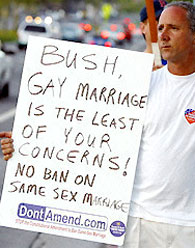A divided U.S. Senate on Wednesday foiled a constitutional amendment banning gay marriage, virtually killing it for at least this election year, "deeply disappoint(ing)" President George Bush.

Polls show that while most Americans oppose gay marriage, they don't necessarily favour a constitutional ban and would rather politicians focus on other matters such as Iraq, health care and national security.
Speaking after the constitutional amendment on the issue was rebuffed by the Senate, President Bush issued a statement saying he was "deeply disappointed" with the vote, but said it was a temporary setback and his Republican colleagues will carry on trying to make same-sex marriages illegal in the U.S.
"Activist judges and local officials in some parts of the country are not letting up in their efforts to redefine marriage for the rest of America - and neither should defenders of traditional marriage flag in their efforts," he said.
In his weekly radio address at the weekend, he called marriage between a man and a woman "the most fundamental institution of civilisation."
"This difficult debate was forced upon our country by a few activist judges and local officials, who have taken it on themselves to change the meaning of marriage," the President said, referring to judges of Massachusetts' highest court who ruled that gay couples could be legally wed and when the city of San Francisco started issuing marriage certificates to same-sex couples.
Although some thirty-eight states have already banned same-sex marriage, lawsuits in Florida, Nebraska, New Jersey and Oregon are seeking to have it ruled legal.
The amendment - which not only provided that marriage within the U.S. "shall consist only of a man and a woman," it also required that neither the US Constitution nor any state constitution "shall be construed to require that marriage or the legal incidents thereof be conferred upon any union other than the union of a man and a woman" - is now unlikely to be passed before the November presidential elections.
In related news, some gay rights activists are "outing" closeted gay staffers who work for members of Congress who support anti-gay marriage and other anti-gay legislation.
Activists John Aravosis and Michael Rogers are separately exposing the aides on Internet sites or through ads in gay newspapers. They are reported to have targeted 20 offices of House members and senators or committees in which they say key aides are closeted gays or lesbians and in which the lawmakers or committee chairmen support the amendment.
Aravosis, a political consultant and gay activist and former staff lawyer for Sen. Ted Stevens, R-Alaska, said, "Frankly, we're giving as good as we get. If they want to have a debate on family values, we'll have one."
"They want to make us second-class citizens, and gay people are aiding and abetting in the effort," said Aravosis who is also the national co-chairman of DearMary.com, named for Mary Cheney, who is openly gay but working for the re-election of her father, Vice President Dick Cheney.
"We want to create a climate where the price of anti-gay prejudice is too high for Congress. I worked on the Hill over 20 years ago, and gay people are everywhere. Unfortunately, too many of us are working for the enemy."
"We're doing it to expose hypocrisy," said Rogers who has conducted his outings on his "BlogActive" at www.michaelrogers.us.
Their efforts are however being denounced by other gay rights activists and causing angst among some gay and lesbian workers on Capitol Hill who fear for their jobs.
"We oppose using sexual orientation as a weapon," echoed Steven Fisher, spokesman for the Human Rights Campaign (HRC), the largest gay rights group in the U.S.
The HRC, Log Cabin Republicans and other gay lobby groups have urged activists not to reveal personal information about gay staffers or members of Congress.
"It's not going to help the cause at all," said Lynden Armstrong, an aide to Sen. Pete Domenici, R-N.M., and a founder of the Gay and Lesbian Association of Senate Staffers, or GLASS Caucus.
"It's not going to change the minds of any member" because they will vote to satisfy their constituents or their own convictions.
"Coming out is a very personal process that people go through," Armstrong said. "It can be emotionally and psychologically difficult. ... It is not fair that they are doing this."
The Washington Blade, the capital's main gay paper, supported the outing. "These are smart, talented, well-educated professionals who could find success in any number of highly paid positions on or off the Hill but who instead have chosen to devote their professional lives to advancing the careers of politicians who would strip them and their friends of basic civil rights protections and even redress of their grievances in the courts," the Blade said in its editorial, "Don't cry for gay Hill staffers."











 Printable Version
Printable Version










Reader's Comments
Be the first to leave a comment on this page!
Please log in to use this feature.